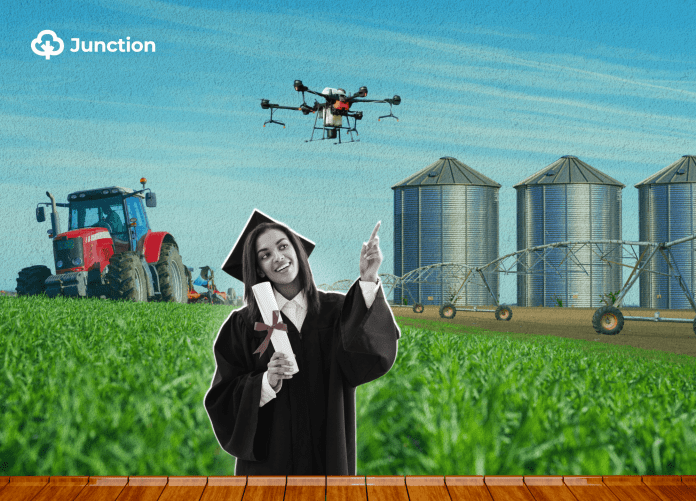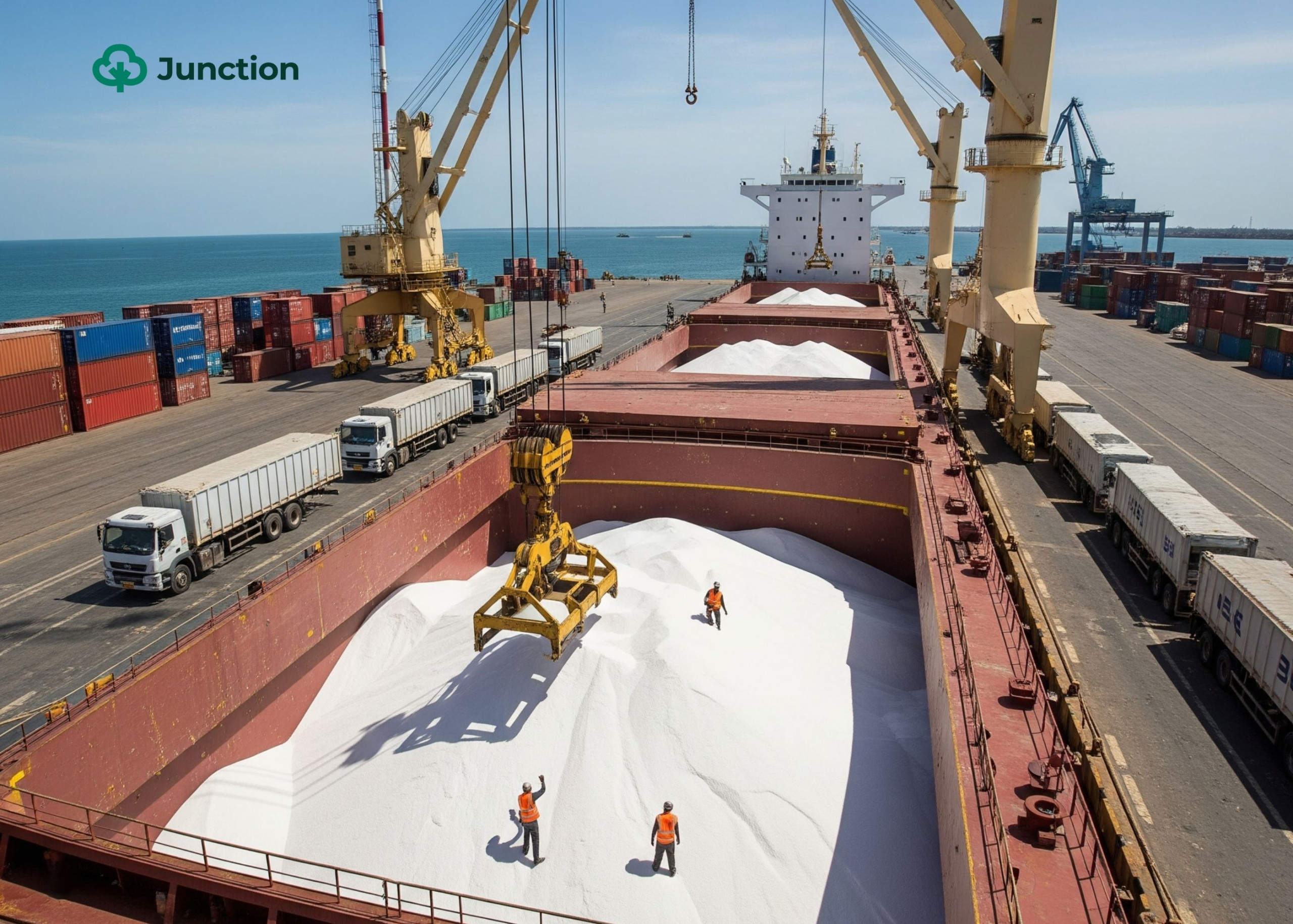While agricultural science has often been viewed as an undesirable field of study, particularly among Nigerian students, the reality paints a vastly different picture. Despite lingering misconceptions, a degree in agricultural science opens doors to a plethora of lucrative and in-demand careers within the job market.
This shift in perspective is crucial, as evidenced by the lack of students choosing agricultural science as a top choice during Jamb registration. This trend, as reported by tutorial center owners in Lagos state, highlights the need to reframe the perception of agricultural science as a viable and rewarding career path.
Despite ancient primary school debates about who is more important between a doctor and a farmer, the latter is not so popular. Yet, agricultural science offers a diverse range of exciting opportunities, particularly in a nation like Nigeria where agriculture remains a critical sector.
This article aims to dispel the outdated stigma surrounding agricultural science by showcasing the multitude of high-demand careers available to graduates in this field. Whether you’re a recent Jamb participant or considering future studies, the following sections will illuminate the vast potential within the realm of agricultural science.
18 underrated agricultural science careers in Nigeria and where you can work
- Agricultural engineer:

Salary range:
- ₦120,000 to ₦600,000+ (sourced from Glassdoor)
Duties:
- Apply engineering principles to solve agricultural problems, optimise resource utilisation, and promote sustainable practices within the agricultural industry.
- Design and develop innovative agricultural equipment and machinery, such as irrigation systems, harvesting machines, livestock management systems, and post-harvest processing equipment.
Work opportunities:
- Government ministries and agencies, non-profit organisations (international and local), as well as private companies such as Nestle, Dangote Sugar, Olam Agri, and more.
- Operations manager:

Salary range:
- ₦190,000 to ₦500,000+ (sourced from Salary Explorer)
Duties:
- Planning, overseeing, and optimising all aspects of production to ensure the farm or agricultural business operates efficiently and profitably.
- Allocate resources effectively, including labor, equipment, supplies, and land.
- Hire, train, and supervise farm workers, ensuring they have the necessary skills and knowledge to perform their tasks effectively.
- Develop and manage operational budgets, track expenses, and forecast future financial needs.
Work opportunities:
- Large-scale farm operations (private and government owned) as well as agribusinesses that process farm produce.
- Food scientist:

Salary range:
- ₦235,000 to ₦656,000+ (sourced from Salary Explorer)
Duties:
- Develop new food products and improve existing ones by experimenting with ingredients, flavors, textures, and processing methods.
- Design and optimise processing techniques like freezing, canning, drying, or fermentation to maintain food quality and safety.
- Conduct research and implement measures to ensure food safety throughout the entire production chain, from raw materials to finished products.
- Analyse consumer preferences and market trends to develop new products that meet specific demands.
Work opportunities:
- Food manufacturing and processing companies, government agencies, private research institutions, and non-profit organisations.
- Grain merchandiser:

Salary range:
- ₦89,000 to ₦342,000+ (sourced from Paylab)
Duties:
- Negotiate grain prices with farmers, often based on market conditions, quality of the grain, and transportation costs.
- Sell grain to food processing companies, livestock producers, exporters, or other businesses.
- Negotiate contracts with buyers, specifying price, quantity, delivery terms, and other relevant details. Make use of futures markets and other strategies to manage price fluctuations and minimise potential losses.
- Arrange for the transportation of grain from farms to storage facilities or processing plants and ensure timely and efficient delivery of grain to fulfill contracts.
Work opportunities:
- Commodity trading companies, food processing companies, government agencies like the national food reserve, agricultural cooperatives, and non-profit organisations.
- Geneticist:

Salary range:
- ₦262,000 to ₦800,000+ (sourced from Salary Explorer)
Duties:
- Utilise various techniques like DNA sequencing and genetic mapping to identify genes responsible for desirable traits in plants or animals.
- Design and implement breeding programs to introduce and combine favorable genes into new crop or livestock varieties.
- Evaluate the performance of new varieties in field trials to assess their yield, disease resistance, and other relevant characteristics.
- Write scientific papers and present research findings at conferences to contribute to the advancement of knowledge in agricultural genetics.
Work opportunities:
- Research institutions like IITA (International Institute of Tropical Agriculture) and IAR&T (Institute of Agricultural Research and Training), government agencies like the agriculture ministry, seed companies, livestock breeding companies, biotechnology companies, and non-profit organisations.
- Extension worker:

Salary range:
- ₦80,000 to ₦150,000+ (sourced from Disciplines.ng)
Duties:
- Educate farmers on new agricultural technologies, best practices, sustainable farming methods, and innovative solutions to improve crop yields, livestock production, and overall farm management.
- Conduct field demonstrations and workshops to showcase the practical application of new technologies and encourage their adoption by farmers.
- Translate research findings from agricultural universities and research institutions into practical knowledge that farmers can understand and utilise.
- Link farmers with financial institutions, input suppliers, marketing channels, and other relevant services to support their agricultural activities.
- Track the progress and impact of agricultural development programs and provide feedback for improvement.
Work opportunities:
- Government agencies, research institutions like IITA (International Institute of Tropical Agriculture), non-profit development organisations like the Food and Agricultural Organisation (FAO), and agricultural input companies.
- Livestock nutritionist:

Salary range:
- ₦140,000 to ₦411,000+ (sourced from Salary Explorer)
Duties:
- Analyse the nutritional needs of different livestock species and formulate balanced and cost-effective feed rations to meet production goals using various feedstuffs like grains, forages, supplements, and minerals.
- Analyse the nutritional content of feedstuffs, determine their protein, energy, mineral, and vitamin content to ensure quality and safety to prevent nutritional deficiencies and health issues in animals.
- Monitor animal health and performance indicators like weight gain, milk production, egg laying, and overall well-being.
- Provide technical advice and support to farmers, feed manufacturers, and other stakeholders in the livestock industry.
Work opportunities:
- Research institutions like NIAT (National Institute of Animal Science), feed manufacturing companies, livestock breeding companies, government agencies and non-profit organisations.
- Soil scientist:

Salary range:
- ₦200,000+ (sourced from Degrees & Careers)
Duties:
- Conduct field surveys and collect soil samples from various locations using specialised tools and techniques to describe soil profiles, noting characteristics like texture, color, depth, and drainage.
- Analyse soil samples in laboratories and conduct tests to determine their chemical composition, pH, nutrient content, organic matter levels, texture, porosity, and water holding capacity.
- Provide recommendations on land use suitability based on soil characteristics and advise farmers on crop selection, fertilisation practices, and sustainable land management techniques.
- Develop innovative solutions to improve soil quality and productivity while working with other scientists, environmental professionals, and policymakers to address soil-related challenges.
Work opportunities:
- Fertiliser companies, government agencies like the agriculture ministry and environmental ministry, construction and engineering companies, research institutes, development organisations and farmers cooperatives.
- Sales manager:

Salary range:
- ₦264,000+ (sourced from My Salary Scale)
Duties:
-
- Manage a sales team to set sales goals, choose territories, develop and implement strategies to achieve specific targets as well as analyse market trends to identify new opportunities in the agricultural sector.
- Build and maintain relationships with clients, ensure their satisfaction and encourage repeat business.
- Oversee the sales process, from lead generation to deal closing, and create sales reports and presentations.
Work opportunities:
- Input companies, large-scale food processors and distributors, agritech startups, and government agencies involved in agricultural development projects.
- Marketing specialist:

Salary range:
- ₦86,000 to ₦298,000+ (sourced from Paylab)
Duties:
- Research market trends, consumer preferences, and competitor activity to understand the landscape for agricultural products.
- Create and implement marketing campaigns to promote agricultural products and raise awareness among target audiences.
- Collaborate with sales teams by providing marketing materials, product information, and market insights to support the sales process.
- Build relationships with the media and manage public relations activities to generate positive press coverage.
Work opportunities:
- Input suppliers, food and beverage companies, agribusinesses, e-commerce platforms, ag-tech startups, and government agencies.
11. Agronomist:

Salary range:
- ₦100,000 to ₦150,000+ (sourced from Jobzilla)
Duties:
- Assess soil health, fertility, and composition by collecting samples, performing tests in labs, and interpreting the results.
- Recommend amendments or treatments to improve soil quality and crop growth.
- Research and develop best practices for planting, cultivating, and harvesting crops.
- Develop strategies to protect crops from pests, diseases, and weeds, which may involve recommending specific pesticides, fungicides, or herbicides, or promoting natural pest control methods.
- Organise educational outreach programs, sharing their knowledge with farmers, extension agents, and policymakers on best practices in sustainable agriculture.
Work opportunities:
- Large-scale farms cultivating cash crops, agribusinesses with integrated farming operations, input companies, government agencies, non-profit organisations,
- Horticulturist:

Salary range:
- ₦80,000 to ₦100,000+ (sourced from Hot Nigerian Jobs)
Duties:
- Propagating new plants through techniques like cuttings, seeds, or grafting.
- Overseeing the operation of greenhouses, which may involve controlling temperature, humidity, and light levels for optimal plant growth.
- Design aesthetically pleasing and functional landscapes that consider factors like plant selection, placement, and hardscaping elements.
- Developing customised maintenance plans for gardens and landscapes to ensure their ongoing health and beauty.
Work opportunities:
- Greenhouses, nurseries, orchards, hydroponic farms, landscaping companies, urban greening projects, government agencies, educational institutions.
- Veterinarian:

Salary range:
- ₦120,000 to ₦180,000+ (sourced from Jobzilla)
Duties:
- Examine animals to identify illnesses, injuries, or other health problems by taking blood samples, performing ultrasounds, or other diagnostic procedures.
- Administer vaccinations to protect animals from common diseases and implementing parasite control programs to prevent production losses.
- Provide treatment for sick or injured animals, including administering medications, performing surgeries, and wound care.
- Assist with breeding programs, monitoring pregnancy health, and performing pregnancy checks.
- Advice on proper nutrition for different types of livestock, considering factors like age, breed, and production stage.
- Develop, monitor and advise on herd health plans and biosecurity protocols.
- Conduct inspections of farms and slaughterhouses to ensure animals are healthy and meat products are safe for human consumption in cases of zoonotic diseases.
Work opportunities:
- Livestock farms, animal clinics, government agencies like the Federal Department of Veterinary and Livestock Services, veterinary pharmaceutical companies, research institutions, animal welfare organisations.
- Economist:

Salary range:
- ₦260,000+ (sourced from Payscale)
Duties:
- Research and analyse agricultural markets, studying impacts of factors like supply and demand, commodity prices, international trade agreements, and consumer preferences.
- Advice farmers on financial management practices such as production costs, resource allocation, budgeting, crop insurance or marketing strategies to improve farm profitability.
- Collaborate with policymakers on agricultural policies that support sustainability, ensure food security, and promote economic growth in the agricultural sector.
- Create reports, presentations, and recommendations for farmers, policymakers, agribusinesses, and publications.
Work opportunities:
- Government agencies like the Federal Ministry of Agriculture and Food Security (FMAFS) and development projects, research institutions like the International Institute of Tropical Agriculture (IITA), agribusinesses, financial institutions like banks, insurance companies, or microfinance institutions, non-profit organisations.
- Agricultural inspector:

Salary range:
- ₦132,000 to ₦450,000+ (sourced from Salary Explorer)
Duties:
- Visit farms and food processing facilities to inspect various aspects of agricultural production like animal welfare, agrochemical usage, and compliance with regulations.
- Collect samples of agricultural products like fruits, vegetables, meat, or grains for testing in laboratories.
- Assign quality grades to agricultural products based on established standards and certify farms or food processing facilities.
- Issue warnings, impose fines, or even recommend product recalls in severe cases as well as document findings and prepare reports.
- Organise workshops, distribute educational materials, or answer questions to promote compliance and improve overall practices within the agricultural sector.
Work opportunities:
- Government agencies like National Agency for Food and Drug Administration and Control (NAFDAC), regulatory bodies like Standards Organization of Nigeria (SON), large-scale agribusinesses and food processors.
- Policy analyst:

Salary range:
- ₦150,000+ (sourced from My Salary Scale)
Duties:
- Research agricultural issues, analyse trends, and assess the impact of existing policies on farmers, consumers, and the environment.
- Collaborate with stakeholders and policymakers to develop new agricultural policies or evaluate the effectiveness of existing ones.
- Translate complex data and policy implications into clear and concise reports, presentations, and recommendations.
- Use data analysis tools and economic models to understand complex relationships within the agricultural sector and predict potential outcomes of different policy choices.
- Work with international organisations on issues like global food security or international trade agreements affecting agriculture.
Work opportunities:
- Government agencies like the Federal Ministry of Agriculture and Food Security (FMAFS), research institutions like the International Institute of Tropical Agriculture (IITA), advocacy organisations, international development organisations.
- Data analyst:

Salary range:
- ₦150,000 to ₦600,000+ (sourced from Glassdoor)
Duties:
- Design databases or implement data collection tools to efficiently gather and store agricultural data.
- Use software to analyse large datasets, identify trends, and present patterns or insights in crop yields, soil health, livestock performance, or market prices.
- Provide data-driven recommendations to farmers to optimise resource use, improve crop yields, or maximise profits.
- Analyse market trends to predict future commodity prices.
Work opportunities:
- Precision agriculture companies, agribusinesses, research institutions like the International Institute of Tropical Agriculture (IITA), government agencies like the Federal Ministry of Agriculture and Food Security (FMAFS).
- Seed technologist:

Salary range:
- ₦240,000+ (sourced from My Salary Scale)
Duties:
- Manage seed production and processing from selecting appropriate parent plants to overseeing various stages of production as well as drying, cleaning, sorting, and treating them.
- Conduct quality assurance tests like germination, purity and moisture to determine the viability of seeds and ensure they will sprout into healthy plants.
- Oversee proper seed storage to maintain seed quality and viability throughout the storage period.
- Ensure seeds are packaged and labeled accurately until they are effectively distributed to farmers.
Work opportunities:
- Seed companies, research institutions like the International Institute of Tropical Agriculture (IITA), non-profit organisations, development agencies.
Entrepreneurship opportunities in agricultural science
Besides the many job opportunities that these careers offer, there is always the possibility of starting your own business with these skills and knowledge. From consultancies to farm operations and mobile clinics, a degree in any of the above-mentioned agricultural science disciplines offers you a way to earn a living.
You can carry out in depth research on any endeavour you want to pursue and see the associated costs, risks and market opportunities before starting out. Also, you can create training programs or workshops for farmers or online educational resources and video tutorials to reach a wider audience.



